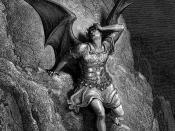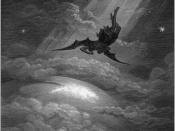In John Milton's Paradise Lost, the narrator urges the reader to assume a skeptical attitude towards Satan's rhetoric and self-representation. In order to portray the false and deceptive nature of Satan's character effectively, Milton had to create rhetoric for Satan that had the appearance of being true. As Satan represents himself as a hero equal in status to God, this effect is achieved as Satan secures both his colleagues loyalty and momentarily gains the reader's empathy in the face of his eloquent speech. To keep the reader from overlooking the fact that his self-representation is merely an illusion, the Miltonic narrator blankets the text with reminders of Satan's fraudulent nature, the falsity of his claims, and his underlying evil purpose. By describing the purity of heaven and God in contrast to Satan, the narrator exposes Satan's true position in the scheme of the universe. The reader becomes increasingly more aware of the falsity of Satan's words and more suspicious of his deceptive ways.
Once the reader actually uncovers the falsities within Satan's speeches after being prompted by the narrator to closely examine them, the illusive nature of Satan becomes not simply a character description, but a demonstrated evil. As the narrator continually prompts the reader to recognize the utter depravity and deceitfulness of Satan's character, the reader's skepticism towards Satan's character is heightened exponentially throughout the poem.
By associating the character of Satan with figures of infamy throughout the Bible and history, the narrator conjures up the reader's preconceived notions of evil and thereby invokes a distrustful attitude towards Satan immediately. By immediately naming the antagonist of the poem as Satan, the narrator allows the reader to recall his prejudices against this evil character from the Book of Genesis...


